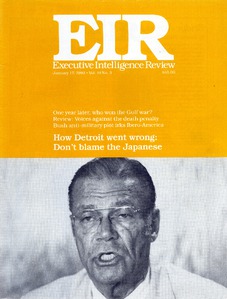Interviews
Lyndon LaRouche
The political prisoner elaborates his proposal for currency reform in the republics of the former U.S.S.R., showing again why he is the only competent economist running for the U.S. Democratic presidential nomination.
Max Johnson
A wheat farmer, Mr. Johnson is president of the Rural Action Movement in Western Australia, and recently completed a U.S. tour to find out who is really behind the crisis in agriculture.
Vladimir Kilasoniya
The head of the finance and economics commission of the National Congress of Georgia, Dr. Kilasoniya is also a member of the National Democratic Party, Georgia’s oldest and largest party.
Books
When Blind Justice Kills, the Innocent Die
by Gail G. Billington
Congregation of the Condemned: Voices against the Death Penalty, edited by Shirley Dicks.
Challenge Put to African Intellectuals
by Baj Thierno
Et si l’Afrique refusait le développement? by Axelle Kabou.
Departments
Report from Bonn
by Rainer Apel
Germany Again Under Terrorist Attack.
Report from Rio
by Silvia Palacios
McNamara Wins a Round.
Middle East File
by Joseph Brewda
Prince Bandar and the Iran-Contra crew.
Books Received
Letters to the Editor
Editorial
1992, the Year of Columbus.
Science & Technology
What Climate Models Really Show about Global Warming
by Gerd R. Weber
Greenhouse “experts” point to the fact that temperature has risen over 100 years, and that six of the hottest years have been in the last decade, to “prove” their claims. Part 2 of Gerd Weber’s report refuting them.
Economics
Bush, Miyazawa Ignore the Important Issues
by Kathy Wolfe
The problem is that Bush is a British toady, and Japan lacks the guts to confront the British “Versailles System.” So tragically, both countries are pursuing the policies which will lead to disaster.
Currency Rates
U.S. Unemployment Cover-up
A new economic indicator, exclusive to EIR.
On Currency Reform in the Former Soviet Union
by Lyndon H. LaRouche, Jr.
LaRouche explains why the new governments are obliged to stop criminals from provoking a famine, by imposing exchange and other controls.
BCCI: Will the Real Crooks Be Prosecuted?
by Scott Thompson
‘Australia’s Farmers Are Fed Up with Free Trade’
by Marcia Merry
An interview with Max Johnson.
Agriculture
by Marcia Merry
ADM Pushes Ersatz Milk.
Banking
by John Hoefle
The Policymakers Are Bankrupt, Too.
Business Briefs
Feature
What’s Really Wrong with the U.S. Auto Industry
by Marcia Merry
The massive layoffs at General Motors signify that the auto industry has reached a crossroads, where the only serious response is an emergency program to save what is left of the manufacturing sector. Marcia Merry reports.
The Auto Industry and the Crashing of the U.S. Economy
by Anthony K. Wikrent
The state of the industry, as the CEOs of the Big Three automakers traipse off to Japan with President Bush to try to sell cars.
The U.S. Auto Industry Drove Itself into the Ditch
by Marsha Freeman
How the crisis developed, in which employment in what was the largest manufacturing industry in the country dropped by half since 1978, during the “Reagan-Bush recovery.”
Japan Powers Up Electric Car Battery
by Mark Wilsey
At the 1991 Tokyo Motor Show, the Future Electric Vehicle (FEV) was the feature attraction.
International
Who Won the War in the Persian Gulf?
by Muriel Mirak-Weissbach
If the aim was to bomb Iraq back to the stone age, then the victory of the “coalition” powers is called into question by the resolve shown by Iraq to resist, even at the cost of tremendous suffering, and to rebuild.
Leading Economist: Georgia Can Contribute to Europe’s Development
An interview with Vladimir Kilasoniya.
Gaidar Says Reforms Will Topple Yeltsin
by Denise Henderson
Bush Seeks Apparatus To Control East Asia
by Lydia Cherry
‘Peace Accord’ Hands El Salvador to Reds
by Gretchen Small
New Age ‘Culture’ Advances in Argentina
by Cynthia R. Rush
Haiti: Bush, OAS Insist Communist Be Premier
by Carlos Wesley
Why the FIS Won in Algeria’s Elections
by Jacques Cheminade
‘Bush Manual’ Plot To Dismantle Military Ripped by Ibero-Americans
by Gretchen Small
U.S. officials are blaming EIR for all the ruckus.
Documentation: Will usury be allowed to bury Ibero-America?
KGB Employed Danish Anti-LaRouche Agent
by Poul Rasmussen
International Intelligence
National
Washington’s Economic Debate: U.S. Is the Loser
by Kathleen Klenetsky
When the media-designated Democratic presidential frontrunner, Arkansas Gov. Bill Clinton, boasts that he drove down welfare payments in one of the poorest states in the Union, you know that the Democratic establishment is posing no alternative to the Bushmen.
Many States Place LaRouche on Ballot
by Nancy Spannaus
Illinois Declares ‘Technical’ Bankruptcy
by H. Graham Lowry
Kahane Murder: Acquittal Could Trigger Terrorism
by Jeffrey Steinberg
Establishment Media ‘Trash’ George Bush
National News



